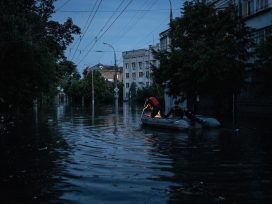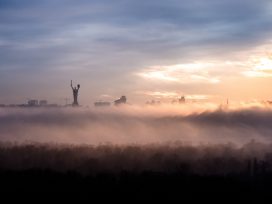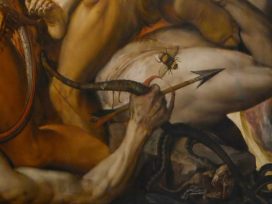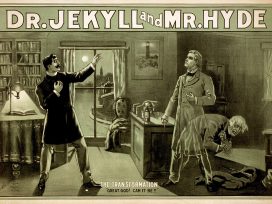Vira walks on unsteady legs through the streets of Sambir. From time to time, she talks to herself as she takes short steps to dodge the hazards on pavements covered with ice and snow. It is January and the temperature has dipped below minus 20. The morning breeze slashes the lips and one can barely take one’s gloves off. On reaching us, Vira looks up and smiles faintly. Vera in Russian, her name means “faith”, though she is not a believer. She is embroiled in a lawsuit against the Ukrainian state, from which she is demanding the pension of her late father, the local boss of the NKVD, the KGB’s precursor. She rejects the pension that corresponds to her as a former civil servant in one of the dusty military institutions from the previous era, though at almost one hundred euros a month, it is not an insignificant sum amidst the country’s crisis and with a devalued hryvnia, Ukraine’s currency. She says she has been deceived by the state. Such mistrust of the state is common; historically, it has worked in favour of the ruling classes, people like Vira’s father. Belonging to the NKVD brought respect based on terror, but also status and privileges. As in Orwell’s Animal Farm, in the new Soviet society, everyone was equal, but some more than others. Vira is one of those people whose situation became virtually frozen, like Sambir’s pipes these days, with the disappearance of the Soviet Union. Her gas and electricity have been cut off after she stopped paying the bills.
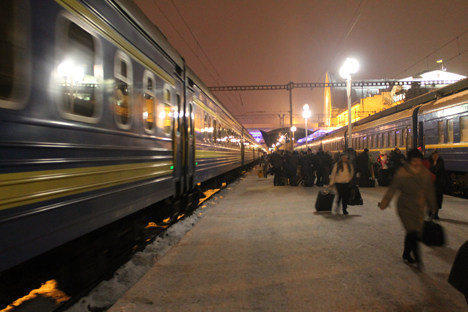
Kyiv train station, January 2016. Photo: Francisco de Borja Lasheras
Some neighbouring families cook for her and discretely give her money – ironically, people who her father terrorised for decades. Many in Sambir date back to the 1944-46 forced exchanges of populations (“repatriations” in the Orwellian speak of the day) between communist Poland and Soviet Ukraine. The historian Timothy Snyder says that 483,000 Ukrainians were expelled from south-eastern Poland while almost 800,000 Poles were in turn “repatriated” from this area in Ukraine. A limping Jaroslav invites me into his house and ushers me into a dimly lit living room full of old furniture covered in dust and black-and-white photographs. He points at a map to show me the region in Poland that gave rise to his family, from the Lemko ethnic group. He was just a child and has only vague memories of marches and fear. When I arrived at a nearby station in one of the old “marshrutkas” (minibuses), the snow was falling relentlessly upon the shoulders of a statue of a simple woman meant to represent the deportations. With a covered head and a desperate look, she is walking along train lines and protecting three children. One of them could be Jaroslav. Vira’s father, a Ukrainian Russian from Donbass (eastern Ukraine), treated the deportees with disdain. During those years, hundreds of thousands of Ukrainians were sent to the Gulag in Siberia, joining masses of other Soviet citizens. Vera’s father’s house was much smarter than those around it, and probably belonged to a deported family of intelligentsia.
Oksana also gives a little money to Vira, although she too is having a hard time. At the age of 62 and after 30 years working as a nurse, she will get a monthly pension of barely seventy euros. That will be the sum of her income if her hospital is finally included in one of the restructuring processes which are under way, part of the reform and modernisation scheme agreed on with the IMF and other organisations which Ukraine is dependent on. In a country without any real social redistribution and going through a dramatic economic hardship, the social costs will end up being high. Many Ukrainians like Oksana nonetheless show a remarkable resilience in dealing with the current situation. According to Yevhen, an academic who leads a group of intellectuals who focus on creating a future vision for their country, each generation here assumes that they have to overcome its own historical tragedy.
Momentarily, this good woman leaves the dough she is trying to teach me how to mould, opens a drawer in a chest and solemnly takes out an object wrapped in rags. It is the helmet that she wore during the Maidan protests. Two years ago she requested leave from work to take a train to Kyiv and help in one of the improvised field hospitals next to the square. In these tents, in churches and flats, people such as Oksana attended to those injured in confrontations with the security forces and the brutal titushkies (hired thugs). It was essential to avoid the hospitals because these violent groups went looking for activists, who were taken away and later found badly beaten or, in some cases, murdered. Yury Verbitsky, a scientist, and Ihor Lutsenko were abducted on January 21, 2014. Ihor was found in a forest, his body showing signs of torture. Yury’s body was found the next day.
Oksana is worried about Ukraine, still controlled by the abusive system they had hoped to change, and about the war in the East. She has not had an easy life. Vira blamed her for having agreed to shut away her ex-husband Volodymyr in a clinic after he was declared an invalid due to his alcoholism. Volodymyr had been an intelligence officer in the Soviet army, a family tradition. His father was a sharpshooter in the NKVD units that wiped out the last traces of nationalist Ukrainian insurgence in the woods and hills of the Carpathians. Breaking the rule that prohibited discussing politics even inside the home (“the walls have ears”, insisted his mother, who, ironically, was a KGB administrator), in private, Volodymyr speaks sarcastically of a USSR which he served but despised. He had many talents: he painted and spoke perfect English, something his daughter Annya learned from him. After violent disturbances in the Siberian prison where he was posted for years, Volodymyr was never himself again, drinking constantly and drowning his qualities in alcohol. The nights of drunkenness, shouting and slamming doors still rang in the ears of Annya as she made her lonely way to school each morning.
In 2004 Annya ran out of her university class, where she had been listening anxiously to the radio, to join the protests in Independence Square during the failed Orange Revolution. Nine years later, on November 21, 2013, she was one of the first to return to that square, not prompted by the radio this time, but rather due to a Facebook post by the Afghan-Ukrainian journalist Mustafa Nayyem. That protest against the then president Yanukovych triggered another wave of political awakening, in a way similar to those underlying the Arab revolts of the past few years. Frustration had been building up in Ukraine against proizyol, a Russian term to describe arbitrariness and unaccountability, and the country’s system of kleptocracy – as well as hopes for something better, including that vague and distant, though inspiring “Europe”. Nayyem is now one of Ukraine’s roughly thirty reformist parliamentarians who are extremely critical of the current president, Poroshenko, and the government. The girls and boys of 2004 are now professionals and volunteers who, in a country where the problem is not just the oligarchy itself, but also the political passivity that nurtures it, comprise a parallel political class, active and demanding. They come from a social fabric in which generational and gender factors are key. There are not just one or two Annyas and Oksanas; there are many more all over the country. They are journalists, activists and anonymous entrepreneurs, less on the media spotlight inhabited by Nayyem and his peers, but perhaps even more necessary. Annya works as an editor and strives to publish quality journalism, critical in nature. Both her and her sister Olya, who works for an NGO, struggle to make ends meet. But despite the uncertainty and the discontent, Annya does not want to leave her country, as her father advised her to do in one of his sober moments. During the harsh period of Yanukovych – who now lives in Russia – she considered emigrating. The Square gave her back a sense of hope.
Something of this nature brought Vanya to Ukraine. He left Putin’s Russia which he hates for its authoritarianism and where there is no place for journalists such as him. The beers flow in Odessa as I talk with him and Peter, a writer whose Ukrainian parents were exiled during the Soviet era. A tall Muscovite with long, heavy-metal hair tied in a ponytail, Vanya speaks Ukrainian and condemns Russian aggression in Crimea and Donbass. But his passport sometimes can make his life difficult in Lviv, the city where he lives in western Ukraine. He tries to take it with a pinch of salt and jokes with his Ukrainian pals on Facebook about how “this Russian is going to occupy the city… and all of your bars”. The ‘likes’ stream into his mobile phone.
There are other Russians like Vanya. After spring, clammy summer arrives in Kyiv. Sat at the bar of one of the capital’s most popular watering holes, I talk to Denis, who is behind the new public administration reform bill. He is an elegant man, whose glasses and goatee give him a touch of the Johnny Depps. During his youthful stint in the Soviet army, like that of Volodymyr, the disappearance of the USSR found him in Ukraine. Between moving to Belarus, returning to his native Russia or staying put, he chose the latter. He says it is the wisest decision of his life. We spend the night comparing the tangled web of Ukrainian politics with Star Wars, a symbolic analogy which was commonplace in the Square, besides mentions for Harry Potter and The Lord of the Rings (the Yanukovych regime was Mordor, the police and titushkies Orcs, Putin was cast as Voldemort, etc.). Denis is bidding to destroy the Death Star, filling the rotten parliament, the Verkhovna Rada, with a deadly and creative wave of reformists. “Wave” is in fact the name of the new party, Khvylia, which Denis and others recently launched, also incorporating prosecutors sacked by Viktor Shokin, the former attorney general, for investigating corruption networks within the state prosecution service itself. The scandal saw Shokin removed from his post after a great deal of popular and Western pressure. Such rackets, crime and attempts to block reforms are now the investigative concerns of Oleg, a Muscovite who came to Ukraine for the same reasons as Vanya. It has gone largely unnoticed, but it was Ukrainian investigative journalism and persistent civil society work that detonated the financial revelations relating to Yanukovych’s Party of Regions which sank, thousands of miles away, Paul Manafort, Donald Trump’s campaign manager and consultant to the former president of Ukraine.
At times of uncertainty, change and fear, that very real Russia which irritates Vanya, Oleg and Denis is confused in some minds with a utopian vision of an ideal Russia, a protector. This Utopia is conflated, in turn, with a USSR which suddenly abandoned so many orphans across the so-called post-Soviet space. Orphans such as Nikolai – a sturdy former Russian soldier, with deep-set brown eyes, a mighty nose, white beard and sailor’s cap – whom I meet on the docks in Odessa, gazing absently at the water below and the waves breaking nearby. He “is from all over Russia” and served its navy in many ports. Some babushkas (grandmothers) approach the waterfront in their traditional headscarves, with broad cheekbones, red cheeks and tired faces. They come across as very entertaining and quaint until you hear their political opinions, sometimes yearning for the totalitarian Soviet past. At times, I am reminded of those respectable and equally quaint ladies at Sunday Mass in Spain who still talk with nostalgia about Franco and his time, as opposed to the current instability and trying.
The Kremlin knows all about these orphans of the USSR and nostalgia for Great Russia. Although their numbers have been exaggerated, there are some in the declining Donbass, where industry once thrived and today only loss-making factories remain. Skilled spin doctors and grey cardinals from another square, the red one a thousand kilometres away, also understand the obtuse mindset of some ideological Westerners, so sceptical of processes of emancipation elsewhere that go against their ideas and dusty political manuals, alas notably blind and uncritical when looking towards the red square. Such Westerners would deny even the most tangible evidence, even if Uncle Stalin were to personally take them on a guided tour of the gulag or the graves at Katyn. It was with all of these people in mind that the Kremlin effected its massive download of Russian nationalist and Soviet software (the latter was often a front for the former), unleashing one of the most effective propaganda operations since the Cold War. Just as Milosevic’s Belgrade of the 1990s inundated the airwaves with terrifying news about the throat-slitting Islamists of Sarajevo who were about to annihilate the defenceless (although well-armed by this stage) Serbian population of Bosnia, Moscow and its mercenaries bombarded the television with shocking, and more often than not, fabricated stories of Ukrainian fascism. As was Sarajevo’s Islamism, that fascism is still marginal in political terms (at least below the European average nowadays), but undeniably problematic and visible if you keep looking for it, googling incessantly, and fanning the flames, which is what the game is about. Such propaganda altered the perception of reality in minds in the Donbass and Crimea (and among some Europeans too), justified outright aggression as self-defence, and took advantage of a real mistrust of the state’s bad governance, a problem which is exacerbated indeed by some of the populists and radicals in Kyiv. The constant and manipulated clash between narratives and realities wipes away reason and polarises societies which were not so divided at the outset, another echo of Bosnia. Some degree of confusion is inevitable sometimes as no one can be non-stop Orwell’s Winston Smith in our times of information wars.
As well as the orphans of that ideal USSR-Russia, Ukraine also attracts many victims and orphans of a very crude, real Putinism. Still fresh in my mind is the image last January of a memorial image in Sambir to some 20-year-olds, smiling, before setting out for the front in their Sunday best, their eyes betraying uncertainty. Around their photograph, the candles flickered in defiance of the wintry cold and the snow. Girgi, a tough and reserved Georgian sniper I ran into in a remote Carpathian village, tells me succinctly how his father died in a Russian attack on his village, near Abkhazia. He raises his voice to offer long vodka toasts in Russian, stirring embers over the shashlik amidst odes to love, the Basques of the Caucuses and freedom for Ukraine. People around in the beer hall look up for a moment, soon going back to their chatter. In Georgia, the country he served in Afghanistan (he shows photos of him in full camouflage fatigues in arid Kandahar), he could be arrested for participating in a foreign war.
Girgi returns to the East via Sloviansk, arriving by train in the midst of this summer’s escalation along the front, two years after Kyiv had regained control of the situation. Fury against Russian fascism – displayed in a nearby graffiti “Ruscismus nyet!” – is patent in Viktor, who greets me in a shabby printing press office. He recounts the months during which Sloviansk was ruled by the “rebels”, mercenaries from all corners of the post-Soviet space alongside Russian soldiers and intelligence services in what is called the Kremlin’s hybrid war. In these streets, Girkin, a moustachioed veteran and Russian ultra-nationalist known as “Strelkov”, barked orders to organise the “Donetsk People’s Republic” (DPR), then led by his Muscovite comrade, Vorodai. That July of 2014, Strelkov would publish an ephemeral but unforgettable post on social networks, almost boastful about the downing of what they thought was a Kyiv plane, and which turned out to be flight MH17 of Malaysia Airlines with three hundred passengers on board. Now back in Moscow, he takes every opportunity to share his heroics and criticises Putin for not invading Ukraine in its entirety. In this same sunny street there is a sinister building of red bricks and grated windows where Strelkov and his people locked up supporters of Kyiv and activists. The torture meted out here sent Viktor to hospital for two months. On the wall, a councillor from Hórlivka (Górlovka, in Russian) called Volodymyr Ribak smiles like the Sambir boys from his commemorative plaque. He was found murdered on the riverbank, his stomach ripped open. Hybrid war can be very real too.
Viktor rants about the current authorities in Kyiv and the oligarchs, who stifle real democracy. He has hopes for people like Masha, who is keenly observing our encounter. This young woman with long brown hair is one of the displaced from Hórlivka, held by the pseudo-republic set up by Strelkov and company, and constantly supplied by Moscow. Her grandmother did not wish to leave her home city. Masha manages to visit her from time to time, though she must be cautious given her dual profile as pro-Ukrainian and activist. Walking between ruins and bombed-out buildings on the outskirts of Sloviansk, she explains her idea of promoting a positive narrative for Eastern Ukraine, based on local development and better democratic governance providing opportunities so that young people are not forced to leave. She does not want war. Nor does Denis, a young man passionate about Spain. But such good intentions and projects for a brighter future are put at risk by this war, with its casualties, including civilians, and abuses on both sides of the nearby front line, not to mention the political polarisation it has caused. Denis, a journalist from Donetsk who had to give it up after the brutal repression against pro-Maidan activists, is pessimistic. He gives me a detailed account of the convulsive events of 2014 in Donbass. He is neither able nor wishes to return to Donetsk. He clicks his tongue bitterly and says that the Kremlin’s plan has worked and will last, once blood has been shed. He sees little future for any idea of reconciliation in the current security and political climate – a controversial topic even between critical and progressive figures.
Voices such as those of Annya, Masha, the two Denises and others are nowadays better represented in small parties and political and citizen groups, which are not controlled by the oligarchs. Their demands are also conveyed in lone reformist voices now unevenly associated with the old parties. Such new forces have gained some representation in the latest local elections, including in the East, despite all of the existing difficulties and an electoral system that favours the system. But president Poroshenko and his circle in Bankova street, some 540 kilometres away, are not remotely interested in changing a system of which they are fully part of. Two years after the Maidan protests, the administration confirms that the old guard knows only how to be the old guard, reverting to certain habits, sometimes not dissimilar to those of Moscow, such as the use of political technology or the toxic language hurled at critical civil society voices and investigative journalists – especially when they report inconvenient truths regarding elements now in power. Comparisons, though nuanced, between Poroshenko and Yanukovych have popped up in discussions. Yet without a larger public presence (and media coverage) for reformists and new voices to galvanise other social segments, disillusioned but passive and resigned, the customs, abuses and horse-trading of Old Ukraine will drag on. Customs and abuses which, in the Mafioso tradition, as can be seen in the regions, maintain the influence of politician-criminals who dole out favours and offer winning hugs to pensioners, particularly around election time.
Returning to a Kyiv mired in the political crisis of the day at the end of summer, I speak to Nataliya and Angelina, who run a new independent television channel via internet from an office block. Staff here work at a frenetic pace, without lifting their gaze from the screen. Both are worried about populist manipulation of patriotic sentiment which leaves professionals like them in the crossfire between blacklist prone separatists and heavy pressure from certain powerholders in Kyiv. Ukraine is very vulnerable to internal and external tensions, fearful that the West and EU – dominated by anti-ethical attitudes and where Europhobes and pro-Putin extremists have increasing influence – will abandon them definitively. This polarised context of war and crisis, with populism on the rise and the unchecked abuses of an unreformed security apparatus, has to some extent the appearance of the United States after 9/11 or today’s Europe, but without the foundations of a pluralist democracy based on the rule of law. These are dangerous times, also for those journalists who were part of the civic fabric that spawned the Revolution, referred to here as that of Dignity, even if civic criticism and democratic pressure is now part of Ukraine’s political DNA and, ideally, is here to stay. Recently, Pável Sheremet was killed in a bomb attack aimed at him, his partner, or her media organisation, the Ukrainska Pravda. Like Vanya, Oleg and others, this Belarussian journalist had found his place here, managing to irritate the powerful in Moscow, Belarus and Ukraine. Angelina and Nataliya’s TV station is in the eye of a storm, but time here is like gold; to dally is an unaffordable luxury, not to mention succumbing to defeatism. Angelina finishes her expresso and smilingly says in Spanish “No pasarán“, as both rush back to the studio.
Some hours later, at the bar in Alquimista, a new trendy place in Kyiv, I try to visualise the future. The waiter has identified me as an easy pray and serves me again and again. Perhaps the revolution, like the West, has died and the system’s counter-revolution could be on the way to victory. Revolutions tend to be annihilated by reactionary and conservative responses. We live in a time of crude geopolitics, that “science” which interested Nazism because it tends to place small peoples at the mercy of imperial whimsy, confirming Thucydides’ maxim that “the strong do what they can and the weak suffer what they must”. Besides, this is an era of autocrats, populists and Trumps, while the Europe of rules and values declines. The usual thing therefore, as Afghans and Bosnians know too well, would be for international politics to trade these people in great games with maps, bought and sold like collectible cards with the eventual strongman, in the holiday villa in Yalta. Ethnicities and Daytons are created where there are, in fact, complex logics of class conflict, social emancipation and progress. That caste of gangsters and mediocre fanatics with a knack for provoking conflicts but who never build anything ends up being consecrated in power. Under such circumstances, Ukraine will be at best hope muddling through for years, swaying one way and then the other between advances, setbacks and a latent conflict. The ambitious transformative experiment could well fail.
Then again, with each filled glass I feel a little more cheered as I think about that civic discourse which persists, despite all the bad news, in the people I have met over these years. Their daily display of commitment reconciles one to the European Utopia, outside the EU. I think about the seeds of a deliberative democracy which debates over new anticorruption institutions, how to create a democratic party which is attractive across the regions, or a decent public transport system for Sambir, all in a nave and critical fashion. I think about the crowded Gay Pride event held in Kyiv without any incidents this year under police protection, to the joy of my gay friend Zorian and his partner. I think that maybe the notes of the Rolling Stones’ “Gimme Shelter” did not die in the late 1960s. But most of all, I realise that I am full of admiration for these individuals whose stories defy our facile modern scepticism and which are joining forces to break the chains of the past, that heavy history which trapped Vira and Volodymyr. That god damn historical malice which has cut short the lives of Girgi, the boys from Sambir, and so many others. I think of all of those who, beyond photographs and shocking headlines, decided to stick it out until the end, even though this may be predetermined. At the very least, I will tell their stories. Because, just like my surroundings reflected by the blurry bottom of my half-empty glass, all becomes confusion and noise when you leave the Square.
